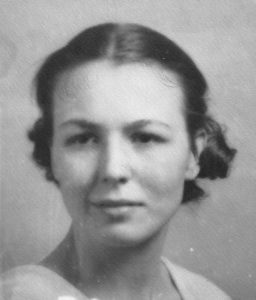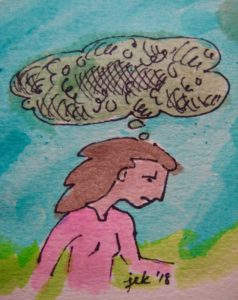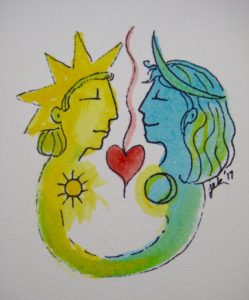
– Photo by Jan Ketchel
As I recapitulated my childhood of sexual abuse, I would often wonder why I had lived such a life? What was the purpose of it? In the beginning I could find no logical reason, nothing made sense to me. It felt like a painfully useless, wasted childhood.
As I learned more about myself during my three-year-long recapitulation, however, I began to appreciate the child I had been, felt more succinctly her struggles, her pains and fears. I also eagerly embraced the many mystical experiences she had had, and that I too began to have again, in ever increasing numbers, as I understood that her childhood exposure to sexual abuse had afforded her access to such things, things I would never have had the opportunity to experience had I lived a different kind of childhood.
Ponder the following quote, from Edgar Cayce, 20th Century American psychic and medical intuitive. (Cayce, a devoted Christian, unwittingly discovered that he had access to the absolute knowledge of what he called, the Source, while in trance. He provided countless medical readings for afflicted patients that guided doctors to healings.)•
“No soul takes on flesh without a general plan for the experience ahead. The personality expressed through the body is one of many which the individuality might have assumed. Its job is to work on one or several phases of the karma of the individuality. No task is undertaken which is too much for the personality to which it is assigned—or which chooses it. (Some souls choose their own entrances and set their own tasks; others, having made too many mistakes and become dangerously subject to earthly appetites, are sent back by law at a time and under circumstances best suited to them.) The task is seldom perfectly fulfilled, and sometimes is badly neglected.”
Do we really come into this world to be abused, to live a sad and neglected life at the hands of others? Have we lived several lives being abused and neglected? Are we assigned, or do we choose, to live a childhood of sexual abuse because we can handle it and our Soul advances because of it?
As is revealed in the final volume of The Recapitulation Diaries, which I am writing now, I did come to discover that my life as an abused child was not a useless, painful waste of a life but an opportunity to learn and grow. It was through my intense inner work, the work of recapitulating my entire life, that I evolved, and, I believe, fulfilled my Soul’s intent in this life to resolve the issue of abuse and neglect once and for all. During my recapitulation I was also exposed to a bigger picture, to ideas I had previously only briefly wondered about, for it was through the deep work I did on myself that I experienced the possibility of past lives, the idea of karma as a viable work order for a life, channeling, and life after death as a true potential. Such things have now become central to my life.
I was always very sensitive, empathic to the point of feeling other people’s feelings and pain, but rarely my own. During my recapitulation, in the final few months, I finally began to experience my own feelings and emotions, which had been blocked my whole life, up until that point.
I had been born into a family where emotions were not allowed, feelings rarely expressed, and I learned to follow the family rules early in life. Better to withhold emotions than to be ridiculed or shamed for having them. I learned to hide my true self.
The following quote, also from Edgar Cayce, made me realize that the family I was born into, that family that I found so rational, so cold and insensitive, was the perfect setting in which to work toward becoming and owning the truly emotional, feeling, sensitive being I really was at heart.
“Choice of incarnation is usually made at conception, when the channel for expression is opened by the parents. A pattern is made by the mingling of soul patterns of the parents. This sets up certain conditions of karma. A soul whose karma approximates these conditions will be attracted by the opportunity presented. Since the pattern will not be exactly [their] own, [they] must consider taking on some of the karma of the parents—relatively—in order to use the channel. This concerns environment, companionship with the parents, and certain marks of physiognomy.”
From this explanation, I would have to say that I chose my emotionless parents as the perfect pattern in which to finally confront my own karma. Perhaps I had lived previous lives as rationally cold-hearted as my parents, especially my mother, who even today at 95 has yet to crack the emotionless facade that has always encased her. Perhaps I saw them as the right vehicles to force a personal karmic change. Born into a family that dismissed emotional outlets as sentimental chicanery, I was forced to either follow suit or fight to find a way to be who I really was. I chose the latter.
At the same time, my childhood of sexual abuse was well-served by the lack of emotion in my family. I learned early on to keep a stiff upper lip, to be independent, stoic and uncomplaining, to hide what I was really feeling. On the one hand, these personal attributes served my abuser well, for he was assured by my strong quiet demeanor that I would not betray his secrets. But on the other hand, inside myself, I knew I was not that hard being that I pretended to be, though I learned to emulate my mother’s personality to a tee.
I struggled through the first half of my life with how to be. Should I uphold the family values or blaze my own trail? Could I really break ranks with the family patterns, leave them behind, and move on into a new life of my own creation? You bet I could!

– Artwork by Jan Ketchel © 2002
It was not until I recapitulated my childhood self that I realized my choice of career, as an artist and writer, gave me the outlet I needed to attend to my emotional self in artistic, poetic expression. My art had always been my outlet, I realized, where I could be the gentle, sensitive person I really was inside. It was in my art that I could caress the neglected child self and empower the blossoming adult self. It was in my art that I learned to let go of old ideas and forge ahead into new territory, new patterns that served me well, as I learned what it meant to individuate, to grow into the being I am today, the being I always was inside, now matured and whole.
And so, rather than feeling neglected by my distant and emotionless parents, I thank them for giving my Soul, and my individual personality in this life, the opportunity to advance. By their strict teachings, I learned how not to be. I learned that I was not them, though I arrived in this life through them, my Soul having taken advantage of the cold environment they afforded me, to once and for all confront the cold and emotionless side of myself, and resolve my personality of its own emotionless karma forever.
Today, I am a happy, well-adjusted emotional, feeling being. I see the people in my life as having their own karmic issues to work through, those who came through me and those whom I am blessed to have in my life. We all have work to do in our lives that goes beyond just learning to live in the world. We have to learn how to live our Soul’s intent. Reincarnation and recapitulation afford us a way to do that; they are both Soul work.
I found this quote to be another helpful reminder of why we may have come into the life we have come into, why we meet and interact with people and then leave them, why we do the things we do. It’s all about what our Soul needs in order to complete something left undone in previous lives, and the opportunity to advance.
“Things other than pattern concern the soul in its selection of a body: coming situations in history, former associations with the parents, the incarnation, at about the same time, of souls it wishes to be with and with whom it has problems to work out. In some cases the parents are the whole cause of a soul’s return—the child will be devoted to them and remain close to them until their death. In other cases the parents are used as a means to an end—the child will leave home early and be about its business.”
Knowing more about the Soul, and karmic reasons for life’s circumstances and the situations we find ourselves in, we see how reincarnation becomes a viable means of personal transformation and growth. Having a perspective on reincarnation, and Soul purpose, and with the ability to accept the life we are living as a vital step in the evolution of our individual Soul personalities, we are afforded the opportunity to view every moment in our lives as part of our karmic journey to completion, to bringing our Soul to fulfillment.
Of course, it’s always a choice! Or is it?
Love to all,
Jan Ketchel, Author of The Recapitulation Diaries
—
• Excerpts are from There is a River: The Story of Edgar Cayce by Thomas Sugrue, pp. 251, 252
• Brackets […] in the second quote indicate author’s editorial changes
• More about Cayce: Many of Cayce’s original healing recipes are available today, and a hospital that he established in Virginia Beach still functions today as a healing and teaching center: The A.R.E.




